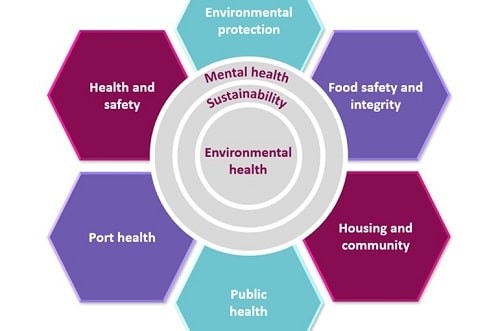The Chartered Institute of Environmental Health (CIEH) has been protecting the public, supporting professionals and influencing policy for over 130 years. The work of CIEH’s 7,600 members encompasses health protection both in work and across our communities locally, nationally and internationally. Our vision is simple: “a safer, cleaner, healthier environment for everyone.”
Opinion
Environmental health professionals: a vital armoury in protecting public and worker health
Our members work as Environmental Health Officers within local authorities enforcing regulatory standards. They are co-regulators with the Health and Safety Executive (HSE) for health and safety legal standards; with the Environment Agency on environmental protection and the Food Standards Agency (FSA) in respect of food safety and integrity. Those working in public health operate in a multifaceted regulatory framework alongside the UK Health Security Agency, particularly in matters of infectious disease, environmental hazards and health emergencies.
Environmental health (EH) professionals also work across a wide range of organisations implementing arrangements, within government and in academia, teaching and overseeing research. EH professionals working at our borders play an important health protection role here and overseas. EH professionals working within the military have a vital role to play where military operations can be significantly compromised due to disease and non-battle injuries.¹
 Louise Hosking is executive director of environmental health at the Chartered Institute of Environmental Health (CIEH). Photograph: CIEH
Louise Hosking is executive director of environmental health at the Chartered Institute of Environmental Health (CIEH). Photograph: CIEH
While many EH professionals specialise in sector-specific specialisms; the power behind the work we do is in the whole which contributes to societal health across everything we do. EH professionals are working in our communities, give a voice to the most vulnerable in society, and regulate standards in work which might otherwise fall out of regulation.
Those working in poor conditions are more likely to live in areas where there is high air pollution, in leaky homes they cannot afford to heat. Expensive energy bills affect the ability for many to store and cook food so it is safe and nutritious to eat. EH professionals working in health and safety will be overseeing organisations which, in the past, may have been labelled as low risk. These could be offices, small business, retail, logistics and micro businesses with standards which are varied. They are frequently on the frontline in respect of identifying modern slavery cases.
Covid saw EH professionals thrust into the spotlight enforcing ever changing standards from local authorities and inside their organisations to ensure they could still operate safely.
Mental health and wellbeing becomes a public health issue when the effects of these issues on the population are considered in a wider context. The effects of climate change are also going to have a profound effect on public health, and infectious and non-infectious diseases.
 Photograph: iStick/adamkaz
Photograph: iStick/adamkaz
Our skills have always been in demand, and this shows no signs of diminishing any time soon.
When I began my first week in environmental health at university, I recall the lecturer describing how we have saved more lives from the work undertaken to provide clean water, reduce pollution, ensuring decent housing standards, safe food to eat, improving working standards and through controls in respect of public health than any medical breakthrough. I do not know whether there is any evidence to back up this extraordinary claim, but it has stuck with me to this day some 35 years later.
Health v wealth dichotomy
EH professionals are in the business of health protection and disease prevention yet the work being undertaken, particularly within our local authorities, is massively under-resourced. At the same time, we are facing rising NHS and medical costs of treating preventable health conditions. A 2018 study by Public Health England (now the UK Health Security Agency), found that between 2017 and 2025, the total cost to the NHS and social care in England of air pollution is £1.6 billion annually.² The HSE identified that work-related accidents and ill health cost the UK £20 billion.³ A 2020 paper from the FSA found that food-borne disease costs society approximately £9.1 billion annually.⁴
These are truly eye-watering amounts of cash before we even consider the personal people toll.
In other words, strong public health protections, in the form of robust regulatory standards, supports rather than hinders a thriving economy. If we are to solve the extraordinarily complex multi-faceted challenges we are about to face while tackling climate change, we are calling for a radical and robust response which creates a more integrated approach to decision-making at every level across organisations, governments and globally, which sees true balance across nature, people, society and the economy. EH professionals are trained and ready to navigate this complex intersection breaking out of the silos of environmental work or health and safety.
This is sustainability in its finest form as defined by the UN: “Meeting the needs of the present without compromising the ability of future generations to meet their own needs.”
Smarter regulation
Some of the UK’s most prominent safety and health organisations came together to form the Occupational Safety & Health Stakeholder Alliance. Together this group united jointly to condemn the government’s journey of placing regulatory standards in the UK under threat by expressing united opposition to the Retained EU Law Bill (now an Act). This placed regulatory standards in the UK under threat by threatening to sunset thousands of items of EU derived legislation at the end of 2023.
For CIEH and our members this went way beyond health and safety legal requirements into other aspects of environmental health. CIEH played an important role as a vocal opponent working with members of the House of Lords in drafting and tabling amendments which ultimately led to the government watering down its initial plans.
A less high-profile UK government policy is in respect of ‘smarter regulation’. CIEH responded to the public consultation in respect of this work with members from across our expert advisory panels. While we support work to reduce or eliminate regulations which over-complicate or duplicate ‘unessential’ regulation, we remain concerned this will lead to deregulation by the back door post-Brexit and we have been following parliamentary work in this regard closely.
Capacity and capability
Environmental health is a profession in crisis. There are not enough new EH professionals coming into the profession to replace our aging workforce. Our local authorities are massively under-resourced and vacancies which do exist are not being filled. Those new to the profession find it difficult to access graduate schemes to support their early learning and development. Opportunities for those graduating extend way beyond local authorities into organisations perhaps more geared up to support their early careers. All of this means resource limitations makes an already difficult job even harder. In January, I attended the briefing from the office for Environmental Protection5 where I asked whether the lack of EH professionals is contributing to our inability to meet important climate change targets. If we do not have sufficient EH professionals to investigate illegal activity how will the government meet its targets?
The FSA recently published a report⁶ which also threw this into stark reality.
 Credit: CIEH
Credit: CIEH
This has become a strategic priority for CIEH this year and we are working with a wide range of stakeholders to understand the issues more fully and, more importantly, create a compelling case for prospective policymakers as we gear up for what looks like will be a general election year.
In recent years, health and safety has re-fashioned itself to adopt a more strategic approach embracing modern leadership skills which puts health and safety firmly in the C-suite, moving beyond command, control and compliance, and stretching across organisations and into supply chains. As the same organisations consider the potential financial risks associated with climate change, EH professionals are well versed to navigate wider corporate and societal risk within this connected area of health which goes well beyond the factory gates.
The EH profession lacks visibility. EH professionals are understated and their role in the pandemic was not widely reported. The holistic nature of environmental health means it spans multiple government agencies, so traction for change can be harder to initiate. Across 2024, we will be releasing policy statements and reaching out to new audiences with a view to reversing this. We will be working with our students and new graduates to reach out to those leaving school or interested in a second career.
Environmental health as a profession has a long history. CIEH has been working with members to protect the public, support professionals and influence policymakers since 1883. As we navigate an ever-challenging landscape and climate change, the role of the EH professionals is more critical than ever. Our challenges are great, but our members are resourceful and are coming together to demonstrate the critical role they have with partner organisations around the world.
If you are interested in hearing more about environmental health, you can sign up to EHN Extra, our fortnightly newsletter sharing the latest environmental health news and stories. We are running our online Health and Safety Conference in March and CIEH also offers an Affiliate membership grade, ideal for those who are interested in the field.
Louise Hosking is executive director of environmental health at the Chartered Institute of Environmental Health (CIEH).
For more information on the work of the CIEH see: cieh.org
References
- Force Health Protection: the role of Military Environmental Health Practitioners, CIEH blog, September 2023, tinyurl.com/ye242uvm
- Estimation of costs to the NHS and social care due to the health impacts of air pollution, Public Health England, May 2018, tinyurl.com/mpa3rzsd
- Costs to Great Britain of workplace injuries and new cases of work-related Ill Health – 2021/22, HSE, hse.gov.uk/statistics/cost.htm
- The Burden of Foodborne Disease in the UK 2018, Food Standards Agency, March 2020, tinyurl.com/mr3avxtd
- Out and about with Louise: the OEP briefing on the Environmental Improvement Plan, CIEH Blog, January 2024, tinyurl.com/9atfw5hj
- Local Authority Capacity and Capability: Executive Summary, FSA, November 2023, tinyurl.com/n27er8xe
OPINION

Is workplace health safe in 2026?
By Kevin Bampton, BOHS on 10 February 2026
UK Government efforts to boost the economy and employment levels through approaches such as deregulation pose a serious threat to the country’s workplace safety standards and the health of our workforce.

How stress and burnout will shape the workplace in 2026
By Charlotte Maxwell-Davies, Mental Health UK on 09 February 2026
Burnout is rapidly becoming one of the nation’s most significant workplace challenges. It is emerging as a defining issue for organisations and wider society, as the UK contends with a long-term sickness crisis driven by poor mental health. Stress can be motivating in short bursts, but when left unmanaged it contributes to work absences and lost productivity, as well as presenting a clear risk to the health of workers.

A new year, a new approach to risk?
By Mike Robinson FCA, British Safety Council on 02 February 2026
The rulebook is becoming obsolete faster than we can rewrite it. While bureaucracies labour to update yesterday’s regulations, the world of work transforms daily.



